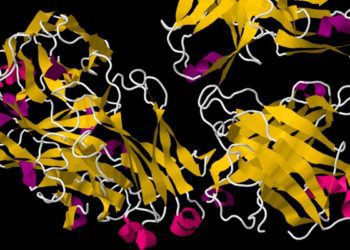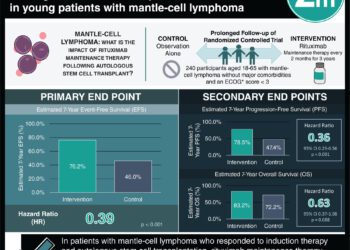Rituximab not beneficial long-term in Sjorgen’s Syndrome
Image: PD
1. The results of this study suggest that rituximab (Rituxin) treatment is not associated with a significant improvement in symptoms or disease activity at 6 months for patients with primary Sjogren syndrome (pSS).
2. There were transient improvements in fatigue symptoms at 6 weeks, but the benefits were no longer significant at 6 months.
Evidence Rating Level: 1 (Excellent)
Study Rundown: Primary Sjogren’s Syndrome (pSS) is a chronic autoimmune condition mainly characterized by diminished salivary and lacrimal function. The disease can often result in debilitating symptoms. Given prior evidence of the pathophysiological role of B-cells in pSS, there has been interest in the possible therapeutic benefit of rituximab, a monoclonal antibody against B-cells often used in the treatment of other rheumatologic conditions. Two previous small randomized, control trials (RCTs) demonstrated the efficacy of rituximab in reducing fatigue and dryness symptoms after 6 months. This larger placebo-control RCT aimed to evaluate the efficacy and adverse effects of rituximab in pSS. The results of this study showed although there was some alleviation of symptoms at week 6, there was no significant improvement in symptoms or disease activity at 6 months in those patients receiving rituximab compared to the control group. In terms of safety, the rituximab group was associated with a higher rate of infusion-related reactions. Limitations of this study include the low baseline disease activity of patients included. Overall, this study provides evidence that treatment with rituximab does not provide long-lasting disease control for patients with pSS.
Click to read the study, published today in the Annals of Internal Medicine
Relevant Reading: Effectiveness of rituximab treatment in primary Sjogren’s syndrome: a randomized, double-blind, placebo-controlled trial
In-Depth [randomized controlled trial]: The TEARS study (Tolerance and Efficacy of Rituximab in Primary Sjogren’s Syndrome) compared the symptoms of patients with primary Sjogren syndrome in patients randomly assigned to receive two doses of 1-gram rituximab (n=63) or placebo solvent (n=59) at week 0 and 2. The study included 122 patients who met the American-European Consensus Group criteria for pSS with onset in the last 10 years and other criteria for biologically active or systemic pSS. All patients received 100mg methylprednisolone intravenous plus 500mg acetaminophen orally before each infusion. Rituximab did not achieve the primary end-point of significantly improving at least two symptoms (≥30-mm decrease in ≥2 of 4 VAS [visual analogue scale] scores) at week 24. At week 6 and 16, there was a transient, clinically significant reduction in fatigue (p-value <0.001 and 0.012, respectively), but the benefit did not last through the 24 week study duration. The disease activity and treatment efficacy as assessed by investigator-physicians were significantly improved at only week 6 (p=0.011 and 0.001, respectively), but the ESSDAI score [European League Against Rheumatism Sjogren’s Syndrome Disease Activity Index], a validated clinical disease activity index for systemic primary Sjogren’s syndrome was not significantly improved at any point in the study. There were no significant improvements in symptoms or disease activity at the end of the 24 week follow-up period.
©2012-2014 2minutemedicine.com. All rights reserved. No works may be reproduced without expressed written consent from 2minutemedicine.com. Disclaimer: We present factual information directly from peer reviewed medical journals. No post should be construed as medical advice and is not intended as such by the authors, editors, staff or by 2minutemedicine.com. PLEASE SEE A HEALTHCARE PROVIDER IN YOUR AREA IF YOU SEEK MEDICAL ADVICE OF ANY SORT.







![Radiofrequency catheter ablation effective as first-line therapy for atrial fibrillation [RAAFT-2 trial]](https://www.2minutemedicine.com/wp-content/uploads/2014/02/afib_-75x75.jpg)